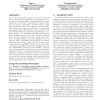Free Online Productivity Tools
i2Speak
i2Symbol
i2OCR
iTex2Img
iWeb2Print
iWeb2Shot
i2Type
iPdf2Split
iPdf2Merge
i2Bopomofo
i2Arabic
i2Style
i2Image
i2PDF
iLatex2Rtf
Sci2ools
SIGECOM
2010
ACM
2010
ACM
The unavailable candidate model: a decision-theoretic view of social choice
One of the fundamental problems in the theory of social choice is aggregating the rankings of a set of agents (or voters) into a consensus ranking. Rank aggregation has found application in a variety of computational contexts. However, the goal of constructing a consensus ranking rather than, say, a single outcome (or winner) is often left unjustified, calling into question the suitability of classical rank aggregation methods. We introduce a novel model which offers a decision-theoretic motivation for constructing a consensus ranking. Our unavailable candidate model assumes that a consensus choice must be made, but that candidates may become unavailable after voters express their preferences. Roughly speaking, a consensus ranking serves as a compact, easily communicable representation of a decision policy that can be used to make choices in the face of uncertain candidate availability. We use this model to define a principled aggregation method that minimizes expected voter dissati...
| Added | 18 Jul 2010 |
| Updated | 18 Jul 2010 |
| Type | Conference |
| Year | 2010 |
| Where | SIGECOM |
| Authors | Tyler Lu, Craig Boutilier |
Comments (0)

